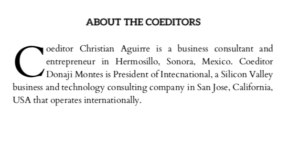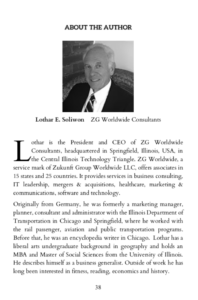Chapter 1 _ Business Adviser’s Consulting & Coaching by Lothar Soliwon
Posted On 01/28/2020 By admin
Below is full text from Chapter 1 of Business Advisor’s Consulting & Coaching e-book.
ZG worldwide has partnered with Design Rush, as a top resource for finding advertising, marketing, software and technology consultants. Design Rush can also assist with workflow automation and software needs of your business. For more info, click here to be directed to website.
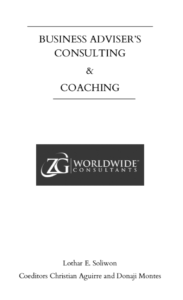
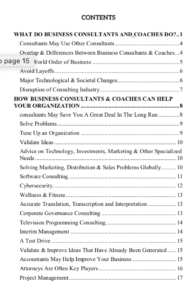
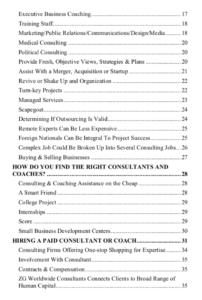
Sample of Chapter 1 from the book Business Adviser’s Consulting & Coaching by Lothar Soliwon.
WHAT DO BUSINESS CONSULTANTS DO AND COACHES DO?
Since you have taken the time to get this book you are likely curious about what business coaches and consultants do. Maybe you need to broaden your understanding in this area since your business has problems that need to be addressed but feel you need to bring in outside assistance. This book approaches the subject broadly as to what business consultants and coaches do. Some readers may think it addresses services that are not truly business consulting and coaching. The providers of many specialized services consider themselves business consultants because they deal primarily with business, answer many questions and advise clients on how to make the best use of their services. They might also be called subject matter experts since they have a deep understanding of a topic, process or skill.
Consultants and coaches could well provide worthwhile benefits to your company, such as improve the use of technology or resolve its human relation problems. You may need help in figuring out how to be a better manager and could use someone to resolve issues within the company or with customers. You may think your business is stagnating and can be improved, have a gut feeling something is wrong but can’t quite put a finger on it, or have specific needs for which you require experts. You may know people who hired consultants or business coaches and heard how helpful they were; possibly you were told they were a waste of time and money. In many cases, these people may be right. Some experts may not really have the expertise needed. They may be going through the motions to look like they know what they are doing but actually don’t have the skills they say they do. Other consultants may have been much more prepared to find better solutions.
Business consultants and coaches offer a wide variety of services for businesses, government agencies and nonprofit organizations. This condensed book provides a general, broad overview of these professions and gives insight about hiring a consultant or coach. After reading it you know much more about business consulting and coaching than the average business person. You will be able to use this information to improve your organization and help it achieve a higher return on its investments.
Coaches and consultants have been around a long time, serving small to large organizations. In the Middle Ages and earlier, kings and religious groups had their internal and external advisors. Military and political advisors as well as educators and clergy have also been very important for years for leaders in many organizations. Lawyers have long played a prominent role as personal and business advisers.
In the early 1900s business and management consulting started to grow and be more accepted as the business environment and technology became more complicated. Executives need help with strategy development, making their operations more efficient, better marketing, overall performance, improvement and integration of rapid advances in technology.
Since the 1960s business coaching and consulting have grown rapidly as more organizations recognized they needed outside assistance in dealing with many complex problems. Even the major multinational corporations hire consultants for supplemental assistance as they seek assistance in preparing for the future and solving problems as they arise. It is impractical to hire full-time people if they are only needed intermittently. New people have new approaches and ideas.
In simple terms, consultants and coaches are people who provide expertise and professional advice for a fee in many areas of business, personal life, health, employment, etc. This can vary from problem solvers who may spend months with complex projects or someone brought in for a short duration to meet a special need. The terms business and management consultants as well as coaches are often used interchangeably and are subject to individual interpretation. Some see business consultants as providing assistance with specific services such as accounting, information technology, finance and marketing, while management consultants delve deeply into the organization and skew towards improving overall business operations. Others see business consultants as helping smaller companies solve problems and make improvements whereas management consultants more broadly analyze how their clients operate and assist their management in making improvements. Some business coaches have very broad backgrounds that enable them to also offer in-depth management consulting services.
Because many specialized business services are very important to the operation and growth of a company, a consultant providing the service often does much more than come in and do the service. They may make recommendations on how to better integrate what they do into the firm’s operations and make fuller use of the knowledge and expertise they provided.
Their plans and alternative strategies based on analyses offer guidance to organizations in preparing for the future. Larger organizations often have their own internal consultants who are used to solve problems throughout the organization, but even those with internal staff may use external assistance if the problems are complex.
CONSULTANTS MAY USE OTHER CONSULTANTS
Consulting firms, even large ones, often draw on consultants from other firms if they don’t have the special expertise internally for a project. It’s easier for the big consultancies to form multidisciplinary project teams since they usually have a broad network of expertise. Many consulting firms offer various degrees of international consulting. Modern telecommunications allows many types of work to be done remotely and has made outsourcing of expertise a huge industry. Many business consulting and coaching firms provide services internationally and cater to the needs and challenges of multinational organizations.
Many consultants give advice and alternative strategies for solving problems and may not implement their suggestions. Some companies want consultants who take this a step further by implementing what was suggested to them since they don’t have the skills.
OVERLAP AND DIFFERENCES BETWEEN BUSINESS CONSULTANTS AND COACHES
Executive or business coaches typically are management consultants who improve the general performance of senior and middle management, but they also may work with the rank and file. They may be experts in a highly specialized niche for which the company needs answers. Some might say having a coach is a sign of weakness, while others think it improves the organization and is an adjunct to its human resources staff. Toxic work environment, lack of employee engagement and succession planning are among the reasons organizations hire business coaches and management consultants.
The functions of business coaches and business consultants have many other overlaps depending on the task at hand. The way this book is written is with much overlap of consulting and coaching in the narrative. A simplistic view of the differences is coaches have an internal organizational focus while consultants look outward at relations with other organizations and external variables. Coaches help improve the individual and act as a guide. Consultants make recommendations and solve problems. Some coaches also work well with helping a client to understand and think through dealing with issues in the external environment. What adds to the complexity is consultants, along with dealing with the external environment, may be faced with things going on with the individual that needs to be addressed that could be affecting how the firm interacts with extremal matters.
Coaches also may have an overlap with what psychologists do, and some are in fact trained psychologists. Life coaches would have more of a slant to psychology than a business coach. Some business coaches have significant business experience and education. They may also call themselves management consultants since they have done considerable work in business endeavors outside their coaching. Many problems faced by organizations are a combination of internal and external issues, which clouds the traits of who is a business coach and who is a business consultant.
NEW WORLD ORDER OF BUSINESS
In recent years the global world of business has seen many great changes that have impacted organizations and resulted in their need for consultants to help them deal with these new complexities. These include the rise of the Asian economies and rapidly changing technologies. Another has been continued changes in how businesses hire. Many companies want to minimize the number of full-time employees and seek more on-demand experts as needed. Currently, 30% of the US workforce is contingency workers, such as temporary, part-time, independent contractor, virtual, and on-call. Some estimates project 40% of the US workforce will be such workers by the 2020s. Employers can cut back on overhead by using consultants and on-demand workers rather than full-time employees and avoid healthcare, training, pension, etc., costs.
AVOID LAYOFFS
Consultants can be a much needed auxiliary workforce when permanence is not necessary. When you hire consultants you avoid layoffs. Layoffs can give the impression that a company is having financial problems when in reality some of their workers aren’t necessary on a full-time basis. When the job is finished the consultant leaves, returning at a later date. You may even be able to keep using the same consultant and skip the learning curve. Small companies in particular can’t afford the hiring of full-time specially skilled employees that are needed intermittently.
MAJOR TECHNOLOGICAL AND SOCIETAL CHANGE
Advanced technologies such as robotics, artificial intelligence, internet of things and blockchain have made consultants who know what they are doing a critical need for many organizations. These are part of the Fourth Industrial Revolution that are combining physical, digital and biological technologies into a very disruptive force for the way we live and work. The large multinational business consultancies as well as some small consulting firms have varying degrees of expertise in successfully helping to integrate these new technologies.
It remains to be seen how many jobs will be gained and lost as these advanced technologies are incorporated. Will there be a small elite workforce that will be in charge of this new technology and vast numbers of workers who will no longer be needed? If this is the case, how will the redundant white-collar and blue-collar workers pay for the necessities of life? Many kinds of consultants continue to be hired by the private as well as the public sector to help resolve these kinds of issues.
DISRUPTION OF CONSULTING INDUSTRY
Consulting is undergoing many changes, just like the retailing, transportation and lodging industries. Many are questioning whether there is value in using consultants, whether there is a positive return on such an investment. There are no easy answers because of the many variables. For one, the consultants actually doing the work at the large, name-brand multinational consultancies may undergo a major disruption in part because the people on the ground doing the consulting only receive a fraction of the revenues generated by their work. The rest goes into overhead such as fancy skyscraper offices, furnishings and the bureaucracies that sustain these companies. The huge and truly complex projects might best be left to the huge consultancies, but a question to be asked is whether the approaches used by the big companies are the most valid means to find solutions or there may be simpler methodologies at a much lower cost provided competently by smaller firms.
Consulting is undergoing many changes, just like the retailing, transportation and lodging industries. Many are questioning whether there is value in using consultants, whether there is a positive return on such an investment. There are no easy answers because of the many variables. For one, the consultants actually doing the work at the large, name-brand multinational consultancies may undergo a major disruption in part because the people on the ground doing the consulting only receive a fraction of the revenues generated by their work. The rest goes into overhead such as fancy skyscraper offices, furnishings and the bureaucracies that sustain these companies. The huge and truly complex projects might best be left to the huge consultancies, but a question to be asked is whether the approaches used by the big companies are the most valid means to find solutions or there may be simpler methodologies at a much lower cost provided competently by smaller firms.
For more information and to read further, buy Business Adviser’s Consulting & Coaching by Lothar Soliwon on Amazon.
Where to buy the book?
Availability in the USA
ISBN 9781092564496
Available on Amazon in USA: Amazon.com
Availability in Mexico
ISBN 9781092564496
Available on Amazon in Mexico: Amazon.mx
Availability in Spain
ISBN 9781092564496
Available on Amazon in Spain: Amazon.es
Availability in Brazil
ISBN 9781092564496
Available on Amazon in Brazil: Amazon.br
Contact: Lothar Soliwon
+1 217 691 0554
info@zgworldwide.com
